Best Organic Non GMO Seeds: Safeguarding Your Family’s Well-being
Discover the Best Organic Non GMO Seeds for a Healthy Harvest
Non-GMO stands for non-genetically modified organisms. This term refers to plants, animals or other organisms whose genetic makeup has not been altered in a laboratory using genetic engineering or transgenic technology.
GMOs are often created to withstand direct application of herbicide and/or to produce an insecticide, while Non-GMO seeds are naturally bred and do not contain any genetically engineered traits.
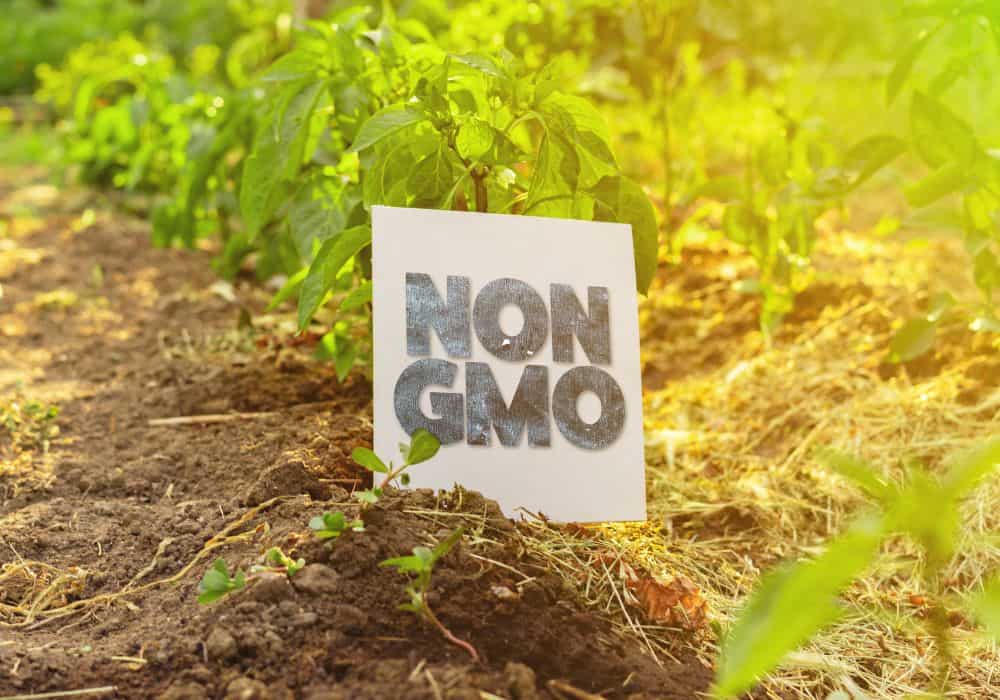
Organic non-gmo seeds have gained popularity among farmers and gardeners due to their natural growth process without the use of synthetic fertilizers or pesticides.
These seeds offer a range of benefits including improved taste, higher nutritional value, and environmental sustainability.
Organic farming practices that utilize these types of seeds also contribute positively towards soil health and biodiversity.
Heavens harvest heirloom seeds exemplify this category perfectly as they are open-pollinated, Non-GMO, non-hybrid seeds.
Open pollination means that the plant is capable of producing seedlings with similar characteristics as its parent plant when pollinated by another representative member from the same species.
This allows for ongoing adaptation to specific growing conditions over time which can lead to more resilient plants in the long run; hence promoting sustainable agriculture practices.
The Importance of Choosing Non-GMO for Sustainable Agriculture
Sustainable agriculture is a significant aspect of preserving our environment and ensuring food security.
One way to promote this practice is by choosing non-GMO seeds, such as Heavens Harvest heirloom seeds.
These are open-pollinated, non-GMO, non-hybrid seeds that are known for their superior quality and nutritional value. Choosing these types of seeds can have a profound impact on the health of our soils, biodiversity preservation, and overall ecological balance.
It’s important to understand how GMOs differ from their non-GMO counterparts in terms of agricultural sustainability. Genetically modified organisms (GMOs) often require increased use of chemicals like herbicides or pesticides which can harm the soil and water resources over time.
On the other hand, Non-GMO crops like those grown from Heavens Harvest heirloom seeds tend to be more resilient against pests and diseases without needing heavy chemical inputs thus promoting healthier ecosystems.
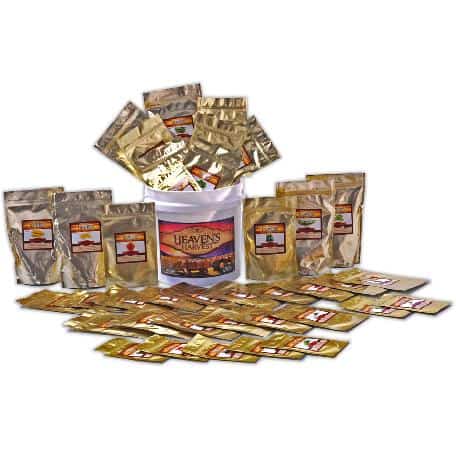
Moreover, Non-GMO crops contribute positively to farmers’ livelihoods too. They generally need less investment due to reduced dependency on expensive chemically synthesized fertilizers or pesticides compared with GMO crops.
This makes it economically viable for small-scale farmers who cannot afford high input costs associated with genetically modified varieties.
Thus sustainable agriculture through non-GMO practices not only benefits our environment but also supports local economies fostering an equitable food system.
The Difference between Genetically Modified and Non-GMO Seeds
Genetically Modified (GM) seeds and Non-GMO seeds differ significantly in their origin, cultivation process, and impact on the environment. GM seeds are created in laboratories using advanced genetic engineering techniques that artificially insert genes from one species into another to create a new organism with desired traits.
On the other hand, Non-GMO seeds like Heavens harvest heirloom seeds are open-pollinated, meaning they naturally pollinate through wind or insects without human intervention.
The difference extends beyond their creation process to also include their effect on biodiversity and food security. GM crops tend to be monocultures – large areas of land cultivated with a single crop variety – which can lead to decreased biodiversity and increased vulnerability to pests and diseases.
In contrast, non-GMO crops encourage diversity as they adapt over time to local conditions enhancing resilience against disease outbreaks or climatic changes.
Moreover, Heavens harvest heirloom seeds being open-pollinated allow farmers and gardeners alike the ability to save these non-hybridized seed varieties year after year contributing further towards maintaining plant diversity.
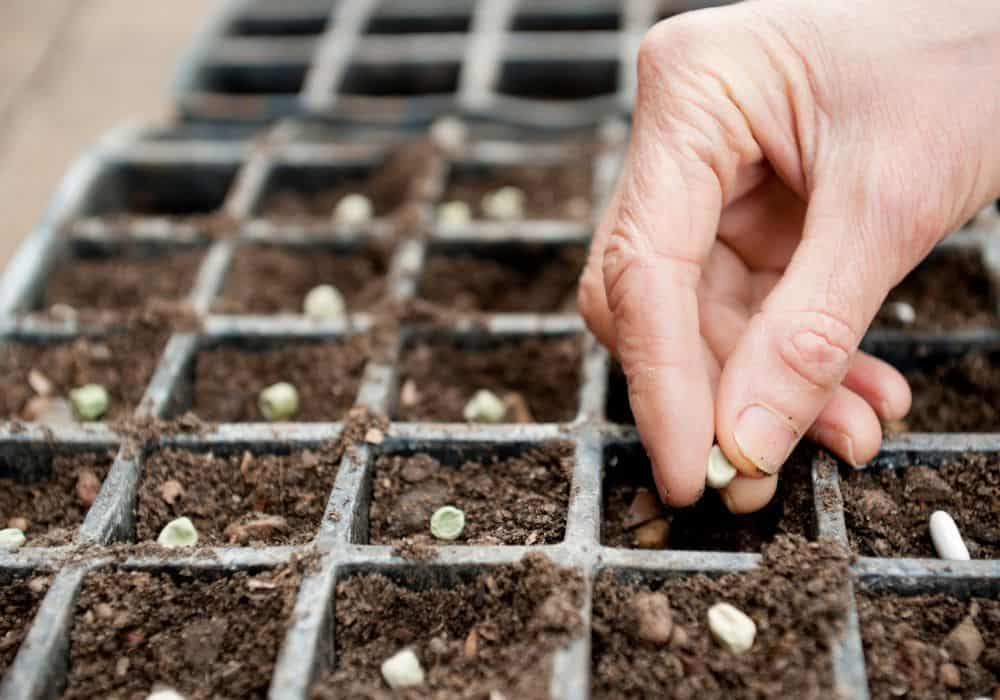
Another significant distinction between genetically modified and non-GMO plants is their impact on health and the environment.
There’s growing concern about potential health risks associated with consuming GMO foods due to limited long-term studies available at present while some research suggests possible links between GMOs consumption & allergies or organ toxicity among others issues.
Conversely, non-GMO foods have been consumed for thousands of years by humans without such concerns arising from them. Furthermore environmental implications cannot be overlooked either; GM crops often require heavy pesticide usage leading not only soil degradation but also collateral damage impacting beneficial insects & birds whereas non-GMO farming practices promote healthier soils free of synthetic chemicals fostering an overall balanced ecosystem.
Get 15% off any order, at the checkout use promo code – SAVE15HH at https://heavensharvest.com/
Benefits of Non-GMO Seeds for Your Garden
Non-GMO seeds offer a myriad of benefits for your garden. One significant advantage is the preservation of biodiversity. Non-GMO plants are typically more diverse than their genetically modified counterparts, resulting in a healthier and more balanced ecosystem within your garden.
This diversity not only enhances the beauty and variety in your garden but also promotes resilience against pests, diseases, and changes in climate.
Another key benefit lies in nutritional value. Studies have shown that non-GMO crops often contain higher levels of essential nutrients compared to GMO crops.
For instance, Heavens harvest heirloom seeds – which are Open-Pollinated, Non-GMO, Non-Hybrid seeds – produce vegetables rich in vitamins and minerals necessary for human health.
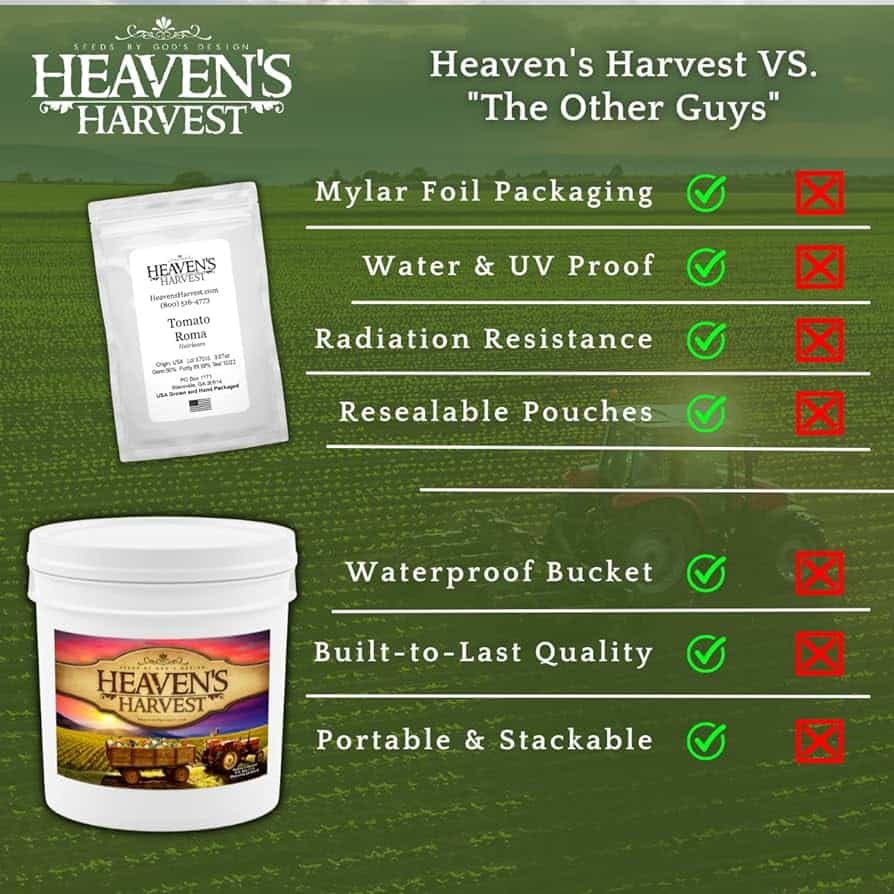
Moreover, these types of seeds can be saved from year to year as they maintain their original traits through generations.
Lastly, growing non-GMO plants contributes positively towards environmental sustainability by reducing reliance on synthetic pesticides and fertilizers commonly associated with GMO farming practices.
The reduced use of such chemicals helps protect soil quality while minimizing harmful runoff into water systems. Furthermore, it supports beneficial insects and organisms that play crucial roles within our ecosystems.
Why Non-GMO is Essential for Health and Environment
Non-GMO products, such as Heavens Harvest heirloom seeds, are crucial for both health and the environment. These seeds are Open-Pollinated, Non-GMO, and Non-Hybrid which means they haven’t been genetically modified in a laboratory setting.
The genetic modification of foods can lead to unforeseen consequences including potential health risks. For example, some studies suggest that GMOs may cause allergies or resistance to antibiotics in humans.
Additionally, non-GMO plants like those grown from Heavens Harvest heirloom seeds contribute positively to environmental sustainability.
Genetically modified crops often require more pesticides and herbicides than their natural counterparts due to their altered nature.

This increased use of chemicals can harm beneficial insects and birds while also contaminating soil and water sources.
Moreover, cultivating non-GMO gardens promotes biodiversity by preserving heritage plant varieties that have evolved naturally over time. Such practice helps maintain healthy ecosystems by supporting diverse insect populations which serve as pollinators for many other plants species too.
It’s clear then that choosing non-GMO is not just about personal health; it’s also an important step towards protecting our planet for future generations.
How to Identify Non-GMO Seeds for Purchase
Identifying non-GMO seeds for purchase can be a bit challenging, especially with the influx of various seed types in the market. However, there are certain ways to ensure that you’re buying genuine non-GMO seeds. One reliable method is looking for certification labels on the seed packets.
Certifications such as ‘Non-GMO Project Verified’ or ‘USDA Organic’ guarantee that the seeds haven’t been genetically modified and were grown following organic farming practices.
Another effective way to identify non-GMO seeds is by purchasing from trusted brands known for their commitment towards sustainable agriculture and non-genetically modified products.
One such brand worth mentioning is Heavens Harvest heirloom seeds which are open-pollinated, Non-GMO, and Non-Hybrid varieties. These heirloom seeds not only give you peace of mind about your garden’s safety but also contribute towards maintaining biodiversity by preserving old plant varieties.
Moreover, it’s important to note that most edible crops like beans, lettuce, peas, tomatoes etc., have rarely been genetically modified due to their natural resistance against pests and diseases; so these are generally safe options too.
Also, remember that GMOs are often used in large-scale monoculture farms rather than small-scale home gardening or organic farming operations – another reason why choosing reputed brands like Heavens Harvest can ensure quality non-GMO seeds for your garden.
Get 15% off any order, at the checkout use promo code – SAVE15HH at https://heavensharvest.com/
Steps to Grow Your Non-GMO Garden at Home
Starting a non-GMO garden at home requires careful planning and preparation. The first step is to select the right seeds. It’s recommended to choose Open-Pollinated, Non-GMO, Non-Hybrid seeds for your garden. One such trusted source of these varieties is Heavens Harvest heirloom seeds which are known for their quality and diversity.
Once you have your seeds ready, the next step involves preparing the soil for planting. Healthy soil forms the foundation of any successful garden. You should test your soil to determine its nutrient content and pH level as this information will guide you in amending it appropriately before planting begins.
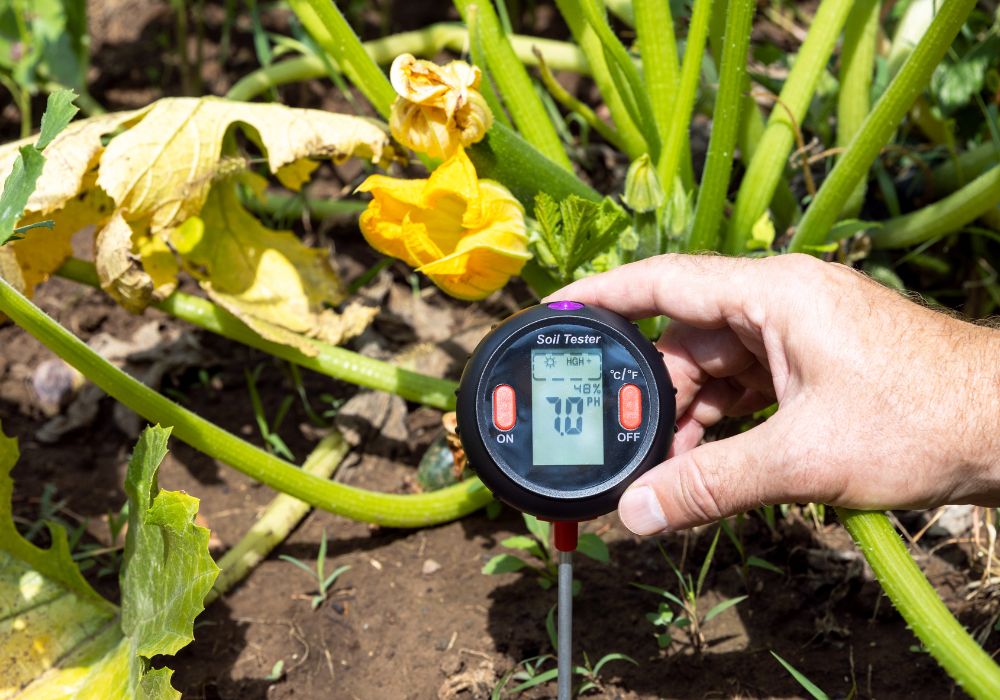
Organic compost or manure can be used to enrich the soil while natural lime or sulfur can adjust its pH level if necessary.
After preparing the ground, sow your Heavens Harvest heirloom seeds following package instructions regarding depth and spacing between plants. Water them adequately but avoid overwatering as this might cause seed rotting or create a conducive environment for diseases and pests.
As they grow, ensure that they receive enough sunlight daily since most vegetables need 6-8 hours of direct sunlight each day for optimal growth.
Tips to Store and Preserve Non-GMO Seeds
Proper storage is key to preserving the integrity of non-GMO seeds. It’s crucial to store them in cool, dry conditions. Too much heat or moisture can lead to mold growth and potentially damage the seed’s ability to germinate when planted.
A simple yet effective way for home gardeners is using airtight containers like glass jars which are then stored in a refrigerator or basement where temperatures remain consistently cool.
Heavens harvest heirloom seeds make an excellent choice for those looking at non-GMO options. These seeds are not only open-pollinated but also non-hybrid, meaning they have been naturally pollinated without human intervention and will produce plants that closely resemble their parent plant.
This gives you the added benefit of being able to save your own seeds from year-to-year, making it a cost-effective option as well.
When storing Heavens harvest heirloom seeds, it’s important to label each container with both the type of seed and date of storage. Over time, some types of seeds may lose their viability faster than others so keeping track helps ensure successful planting later on.
Remember also that different varieties might require unique care; always follow any specific instructions provided by the seed supplier for optimal preservation results.
Challenges Faced While Growing Non-GMO Plants
Growing non-GMO plants can be a rewarding endeavor, but it’s not without its challenges. One of the main difficulties is that these plants often require more care and attention than their genetically modified counterparts.
Without the modifications that make some crops resistant to pests or disease, non-GMO varieties might need additional protection to thrive. This could mean investing in organic pest control methods or taking extra steps to prevent plant diseases.
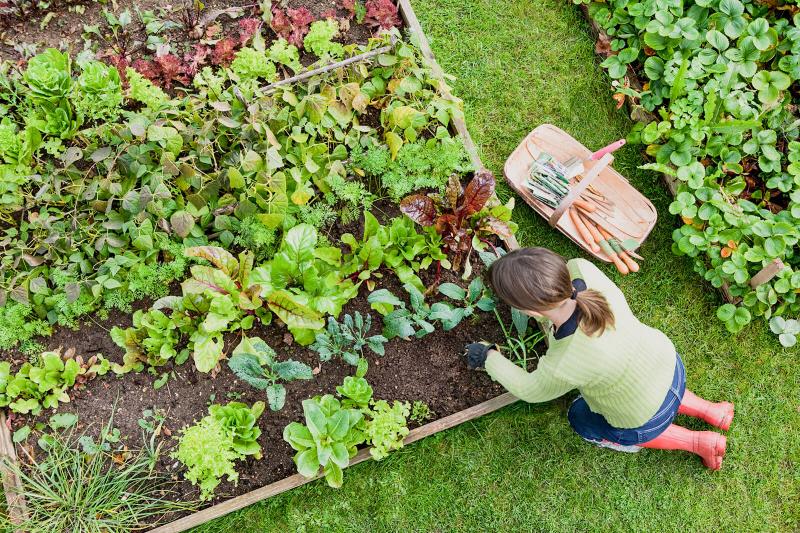
Another challenge lies in sourcing high-quality non-GMO seeds. It’s essential for growers to ensure they are getting genuine non-GMO seeds from reliable sources. Not all seed providers are created equal, and unfortunately, there can be misleading information about whether seeds are truly GMO-free or not.
A trusted source for these types of seeds includes Heavens Harvest heirloom seeds which offer Open-Pollinated, Non-GMO, Non-Hybrid selections.
Furthermore, growing conditions can also pose a hurdle when cultivating non-GMO plants at home. These varieties may have specific requirements regarding soil type, sunlight exposure and watering schedule that differ from those of common GMO crops.
Therefore gardeners must take into account these factors and adjust their gardening practices accordingly for successful growth of their chosen crop variety.
The Future of Non-GMO: What to Expect.
The future of Non-GMO is an exciting and promising one, filled with potential for both our health and the environment. The increasing awareness about the benefits of non-genetically modified organisms has led to a surge in demand for non-GMO products, including seeds.
This trend is expected to continue as consumers become more educated on the subject and seek out healthier alternatives.
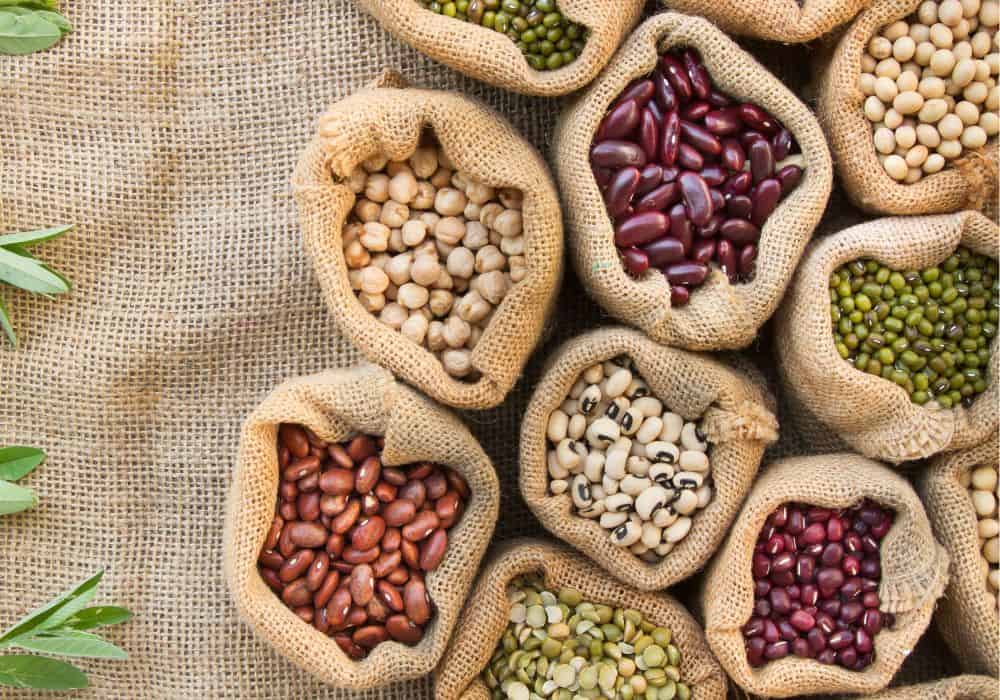
One such alternative that’s gaining popularity are Heavens Harvest heirloom seeds. These seeds are open-pollinated, non-GMO, and non-hybrid. Open pollination ensures genetic diversity which results in stronger plants capable of adapting to changing environmental conditions- a key factor necessary for sustainable agriculture.
Additionally, these types of seeds can be saved from year-to-year unlike their hybrid counterparts offering gardeners self-sufficiency.
Looking ahead, we can expect continued growth in this sector with companies innovating new ways to meet consumer demands while maintaining sustainability principles at their core.
As more people turn towards organic farming practices using non-GMO crops like those grown from Heavens Harvest heirloom seeds, it will promote biodiversity – contributing significantly towards preserving our planet’s fragile ecosystem.
FAQs
What does Non-GMO mean?
Non-GMO stands for Non-Genetically Modified Organisms. This term is used to refer to plants or animals that have not been genetically engineered or modified through biotechnology.
Why is choosing Non-GMO important for sustainable agriculture?
Choosing Non-GMO promotes biodiversity, supports ecological balance, and prevents environmental damage that can arise from genetically modified organisms. It also helps in maintaining the integrity of organic farming.
What is the difference between Genetically Modified and Non-GMO seeds?
Genetically Modified seeds are altered in a lab using genetic engineering to have certain traits such as resistance to pests or herbicides. On the other hand, Non-GMO seeds are naturally bred and have not been genetically modified.
What are the benefits of Non-GMO seeds for my garden?
Non-GMO seeds promote biodiversity, are often more nutritious and flavorful, and can be saved and replanted year after year, reducing costs over time.
How does Non-GMO contribute to health and the environment?
Non-GMO foods are free from artificial genetic modifications that may have unknown health effects. They also promote a healthier environment by reducing the use of harmful pesticides and promoting biological diversity.
How can I identify Non-GMO seeds for purchase?
Look for seeds that are labelled as “Non-GMO” or “Organic”. Also, consider buying from trusted companies that are committed to selling Non-GMO products.
What are the steps to grow a Non-GMO garden at home?
Start by choosing Non-GMO seeds. Prepare your soil with organic compost. Plant your seeds according to their specific needs. Water, weed, and care for your plants as necessary.
What are some tips to store and preserve Non-GMO seeds?
Store the seeds in a cool, dark, and dry place. Using airtight containers can also help in preserving the seeds. Remember to label your seeds with the date and type of seed.
What are some challenges in growing Non-GMO plants?
Non-GMO plants may be more susceptible to pests and diseases compared to GMO plants. They may also require more care and attention.
What can we expect from the future of Non-GMO?
With increasing awareness about the importance of sustainable farming and the potential risks of GMOs, the demand for Non-GMO products is expected to grow. As consumers become more educated, we can expect more transparency and stricter regulations regarding GMOs.




